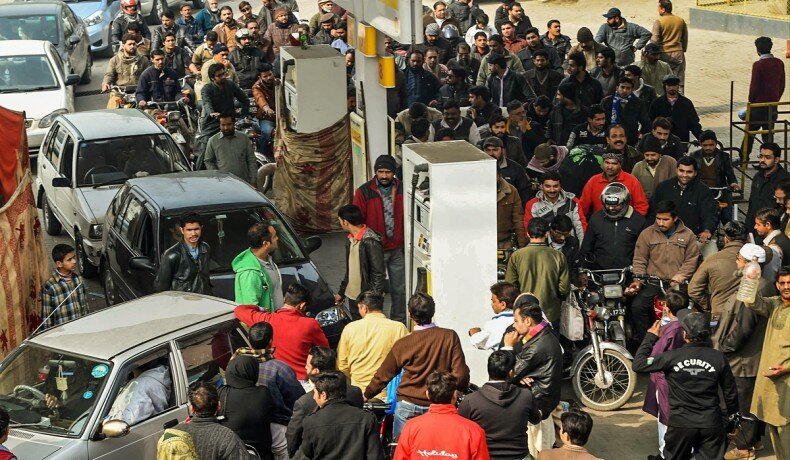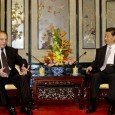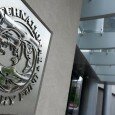By Mehtab Haider –
The re-emergence of circular debt caused recent petrol crisis in the country
Pakistan’s cash-bleeding energy sector cannot overcome crisis like mode on permanent basis without resolving the monster of circular debt that had again re-emerged and peaked to over Rs 370 billion.
This re-emergence of the circular debt had caused recent petrol crisis in the country especially in Punjab which was so far overcome by the incumbent regime through improving supply but until and unless the basic chronic problem of circular debt was not resolved no one could avoid eruption of another crisis sooner or later.
Actually, the financial woes mainly because of this circular debt had choked all credit lines of state run — Pakistan State Oil (PSO) — making it impossible for them to import required petrol in the wake of increased demand after witnessing steep decline in prices of crude oil in international market.
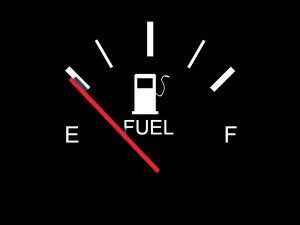 The oil prices in international market had nosedived to below $50 per barrel that had resulted into jumping up the demand of petrol especially in Punjab where the CNG was closed down in winter season.
The oil prices in international market had nosedived to below $50 per barrel that had resulted into jumping up the demand of petrol especially in Punjab where the CNG was closed down in winter season.
Soon after eruption of petrol crisis, the PM Nawaz Sharif had suspended certain top bureaucrats but this crisis required more in-depth analysis instead of finding out scapegoats to shift buck of responsibility on shoulders of others.
The import price of petrol started falling from September onwards but in the beginning of January 2015 the international price of oil had declined by 51 percent. The corresponding decrease in the domestic price is 37 percent.
The major importer of petroleum products is the state-owned Pakistan State Oil (PSO). It imports 66 percent of the petrol, with the remainder, 34 percent imported by other oil marketing companies (OMCs) like Shell Pakistan.
By September 2014, the receivables of PSO rose to the colossal figure of Rs222 billion. In December, a number of L/Cs of PSO were dishonored. This has greatly restricted PSO’s ability to import all petroleum products. In effect, a large part of the circular debt has been parked in PSO.
The impact on import of furnace oil has been even greater. It fell by over 50 percent in the last quarter. This is attributable to the fact that the share of PSO in the import of furnace oil is higher at 91 percent, as compared to the share of 66 percent in the case of petrol.
In December 2014, the country’s import of furnace oil decreased by 37 percent as it stands at 253,000 tons in December 2014 against 398,000 tons during the same month of the last financial year.
 According to the data of Oil Companies Advisory Council (OCAC), the import of furnace oil in July this year stood at 757,000 tons, August 748,000 tons, September 598,000 tons, October 479,000 tons, November 268,000 tons and December 253,000 tons. The import of furnace oil decreased by 30 percent, indicating that the supply of electricity will be hit severely as its fuel was not imported sufficiently.
According to the data of Oil Companies Advisory Council (OCAC), the import of furnace oil in July this year stood at 757,000 tons, August 748,000 tons, September 598,000 tons, October 479,000 tons, November 268,000 tons and December 253,000 tons. The import of furnace oil decreased by 30 percent, indicating that the supply of electricity will be hit severely as its fuel was not imported sufficiently.
The domestic refineries have increased the production of petrol by about 8 percent in the period, September to December, as compared to the previous quarter. But there has been some depletion of inventories of petrol with the OMCs. These companies have carried inventories to below the level of three weeks in order to minimize potential inventory losses of up to Rs7 billion at a time of falling prices. Overall, the availability of petrol in the country has declined.
The decline in supply of petrol has occurred at a time of a big increase in demand due to a number of factors. First, the big fall in price was bound to lead to some rise in demand. In most countries, a 10 percent fall in price of petrol is accompanied by a 2 to 3 percent increase in demand.
There is an additional reason for increased demand for petrol in Punjab. The government announced the closure of CNG stations from mid-November for four months initially in the province.
This has led to diversion of demand towards petrol. A first estimate is that the consequential increase in demand nationally for petrol is over 10 percent. Overall, a conservative estimate of the combined effect on demand of the fall in price and reduction in supply of CNG is 16 percent. Allowing for further price reduction, the demand for petrol will go up to about 16200 tons per day in the country. The proposed increase to 15000 tons is not enough.
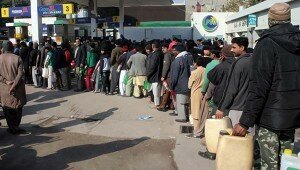 When contacted former Finance Minister Dr Hafiz A Pasha, he said that PSO urgently required injection of Rs 100 billion to overcome its financial woes on sustained basis.
When contacted former Finance Minister Dr Hafiz A Pasha, he said that PSO urgently required injection of Rs 100 billion to overcome its financial woes on sustained basis.
Besides ensuring accountability for the debacle of different ministries and agencies, the former minister said there is need for coordinated and urgent action on the part of the government on a number of fronts. First, there has to be an immediate injection of funds into PSO by the Ministry of Finance of up to Rs100 billion. Second, the problem of mounting circular debt has to be tackled much more vigorously by the Ministry of Water and Power to ensure that PSO does not find itself in the same crippled position once again.
![]() The writer is a senior economic correspondent based in Islamabad
The writer is a senior economic correspondent based in Islamabad





















































































